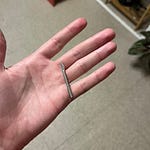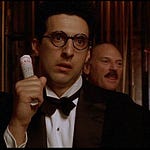“That's one small step for man, one giant leap for mankind.” Mankind (or humankind, as we’d probably say now) has been to the moon. You, the human reading this, almost certainly have not.
In thinking about how we talk about ourselves as a species, I’m forced to reckon with how little I, personally, have to do with our global supremacy1. Whether God granted us “dominion over…every living thing that moves on the earth,” or we’ve just leveraged evolutionary advantage (plus a little luck), humans have been apt, resourceful, intelligent enough to develop calculus, circumnavigation, the combustion engine, plastic, computers, Post-it notes, instant coffee—the full spectrum of technologies necessary to send a guy to the moon and bring him back again all in one piece. Humans did that. I am a human. I am somehow involved, and yet, of course, not in the least. I’ve never even changed a car tire.
A movie cliche you’ve surely encountered is the character who looks up at the Milky Way and says, in awe, something along the lines of, “It makes me feel so small, like an ant.” Ants haven’t built any rockets, but they do accomplish feats of engineering that, like the feats of humans, may be more accurately attributed to the group than to the individual. Scientists use the term superorganism2 to describe the ant colony because individual ants aren’t able to survive by themselves for extended periods; the ant as an individual is contested ground, at best.
Understood as a component of the superorganism, what does a single ant know or do? It knows to collect food and it plays its role within the colony because the colony wants it (understanding want as a not-necessarily-conscious function, here). Separated from the colony, not only is the ant as good as dead but it has no agency, purpose, or knowing.
For all that I don’t believe in it, intelligence is often on my mind. But maybe believe isn’t the right word. I mean, I believe in intelligence, just not in the way that it’s been naturalized. Like “biological sex,” race, or disability, intelligence is a relational, culturally mediated, and context-specific quality wielded as a tool to organize and hoard power and discipline/produce subjectivity. I believe that the smart way to approach intelligence is with skepticism and with the recognition that it should never be taken for granted.
Here, when and where I am, we are trained from birth to understand intelligence as inborn and immutable but also a commodity that’s always for sale; imbuing not just value but morality; directly proportionate to one’s capacity for productivity under capitalism; and existing outside of so-called “identity politics” while also somehow magically aligning with money, power, and whiteness, plus other normalized ways of embodiment3. To me, it makes more sense to think of what intelligence does rather than what it is. In this way, we can start teasing it apart from our essentialist preconceptions, while also reclaiming those aspects of it that are useful, informative, and even, possibly, liberatory.
What good does it do to decide that one person is intelligent and another isn’t? What is gained and what is lost? I don’t mean that we should pretend there are no differences between our minds, but rather that it’s possible resist the poisonous idea that this diversity must exist within a moral hierarchy, or that it’s both utterly vast and yet reducible to a few Scantron tests taken under surveillance by a for-profit company, like your own mind isn’t yours. Can we discuss ability, talent, aptitude, skill, genius, and power, the kinds that we’re hard-wired for and the kinds that can be stunted or developed, as our life circumstances dictate, without dismissing human value? I think we can, with some practice and intentionality.
If you’re a regular reader, you know that my sister, C., has intellectual and developmental disabilities that I don’t. She is not unaccustomed to being dismissed and, frankly, oppressed, for these reasons, even if she doesn’t always understand or recognize when this is happening. As she and I build an adult relationship that goes beyond caretaker and burden—something that we must do together, but that requires a ceding of control and ego on my part—I have begun telling her that she is smart (as well as funny, cool, kind, caring, and hard-working, all of which she is).
At first, this felt unnatural, and I think, though I don’t know for sure, that it surprised her. It’s not something she’s ever regularly been told. But it’s true. Why didn’t I ever tell her that she was smart when she gained a skill, learned a word, told a funny joke, made an insightful observation, or otherwise demonstrated growth (something that all people of all I.Q.s4 can do)? Because it never occurred to me to do so. And because when it finally did occur to me, the notion felt almost taboo, as if I was giving away a finite resource meant to be hoarded for others more “deserving” than she, including myself.
Find me on Twitter. Preorder my second novel, X (Catapult, 2022), out June 28. I have events and everything!
Book Passage Pride Reading: Thursday, June 23, virtual. I’ll soon be announcing my extremely exciting conversation partner—don’t miss us!
The Strand Book Launch with Torrey Peters: Tuesday, June 28, in person.
Subscribe to support GOOD ADVICE/BAD GAY, an advice series from an anonymous gay therapist who’s not afraid to hurt your feelings with the truth. (Sample an unlocked post for a taste of what you’re missing.) 100% of funds go to support a rotating selection of mutual aid and reparations projects.
Want advice? Email badgayadvice@gmail.com for a free 3-month subscription.
Which of us maintains that supremacy and under what terms is well-trod ground here, I hope. Suffice it to say that, in speaking about humanity as a group, I have not forgotten that our power is distributed along the lines of white supremacy and anti-blackness, neo/colonialism, patriarchy, etc.
Some scientists have suggested that humans (rather than humanity) qualify as superorganisms because of our microbiomes.
Eugenics, baby.
Fake.













